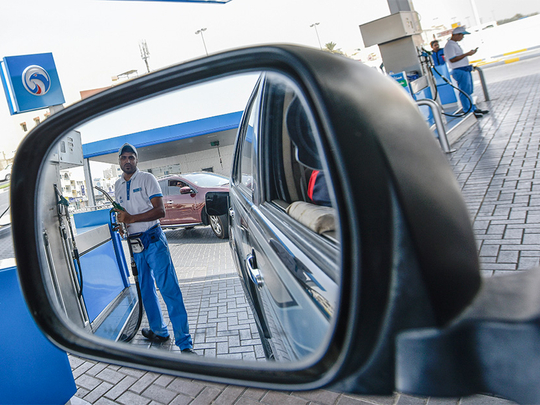
Dubai: The UAE’s decision to deregulate domestic fuel prices in the context of sharp decline in global oil prices over the past one year is seen as a positive move in the direction of stabilising the government finances, say economists and analysts.
“We see the move to deregulate fuel prices in the UAE as positive for fiscal sustainability, especially in the context of lower oil prices. The impact on consumers will likely be limited initially as we expect the removal of subsidies will be done in gradual manner rather than as a one-off increase in prices,” said Monica Malik, Chief Economist of Abu Dhabi Commercial Bank (ADCB).
In the wake of sharp decline in oil prices, multilateral agencies such as the International Monetary Fund (IMF) and the World Bank have been urging Gulf oil exporters to rationalise government spending through phasing out of subsidies and diversification of non-oil government revenue sources.
According to the latest IMF projections, the outlook for economic activity is expected to moderate with real GDP growing at 3.2 per cent and non-hydrocarbon growth projected at 3.4 per cent in 2015 amid lower oil prices and an appreciation of the real effective exchange rate.
A recent IMF Staff Mission to the UAE observed that the UAE has benefited from building up large external and fiscal buffers over the years thanks to its hydrocarbon wealth.
However, with the decline in oil prices, the fiscal balance this year is projected to turn negative for the first time since 2009 to record a revised deficit of 2.3 per cent of GDP.
“The announcement that fuel prices in the UAE will be deregulated is not a huge surprise, with the government recently declaring that fuel subsidies were under review. On a macroeconomic level, reducing subsidies on fuel should benefit the budget directly, helping to offset the decline in oil revenue and possibly freeing up resources for spending elsewhere, such as on infrastructure,” said Khatija Haque, Head of MENA Research.
Analysts said the fiscal expansion in the UAE over the last few years has increased its vulnerability to oil price volatility.
According to the IMF’s revised projections, the UAE’s current account surplus is to decline to 4.1 per cent of GDP this year and the government needed to act decisively to stabilise its funding sources.
“I think the market will perceive this as a very positive measure because it means that government is diversifying the sources of revenue, which is very necessary at a time which oil prices are so low,” Nasser Saidi, founder and president of Nasser Saidi & Associates and former chief economist at Dubai International Financial Centre.
Given the large surpluses the government and some of the sovereign wealth funds control, economists say the UAE has ample room to introduce fiscal reforms in a gradual manner without impacting cost of living and competitiveness of the country.
“Against this backdrop, the macroeconomic policy mix should focus on fiscal consolidation. With large buffers, fiscal consolidation should be gradual and designed in a way to minimise its growth impact,” said Zeine Zeidane, Head of IMF Staff Mission to the UAE.
The UAE is one of the most diversified economies of the region and ranks favourably on competitiveness indicators. While the structural reforms should aim at further diversifying the economy, fiscal reforms such removal of subsidies and diversification of government revenues will strengthen public finance.
“The UAE has been proactive among the GCC countries in introducing fiscal reforms from the fourth quarter of 2015. We believe that other GCC countries will likely have to follow, especially Saudi Arabia, Bahrain and Oman who have higher budget break even oil prices,” said Malik.
Analysts say introduction of moderate levels of taxation will be the next logical step in strengthening government finances in the UAE and the GCC.
“The government has indicated that it is reviewing other measures to diversify its revenue sources, such as the introduction of value added tax (VAT). Any potential introduction of VAT should particularly be positive from a revenue perspective, given the spending by tourists in the UAE. However, this will have to be managed with price competitiveness especially given the strong US dollar,” Malik said.












